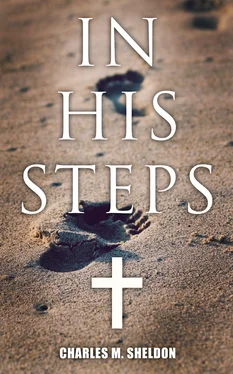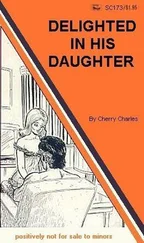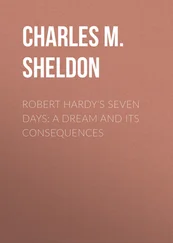But the letter directed Norman's attention to the advertising phase of his paper. He had not considered this before.
As he glanced over the columns he could not escape the conviction that his Master could not permit some of them in his paper.
What would He do with that other long advertisement of choice liquors and cigars? As a member of a church and a respected citizen, he had incurred no special censure because the saloon men advertised in his columns. No one thought anything about it. It was all legitimate business. Why not? Raymond enjoyed a system of high license, and the saloon and the billiard hall and the beer garden were a part of the city's Christian civilization. He was simply doing what every other business man in Raymond did. And it was one of the best paying sources of revenue. What would the paper do if it cut these out? Could it live? That was the question. But was that the question after all? "What would Jesus do?" That was the question he was answering, or trying to answer, this week. Would Jesus advertise whiskey and tobacco in his paper?
Edward Norman asked it honestly, and after a prayer for help and wisdom he asked Clark to come into the office.
Clark came in, feeling that the paper was at a crisis, and prepared for almost anything after his Monday morning experience. This was Thursday.
"Clark," said Norman, speaking slowly and carefully, "I have been looking at our advertising columns and have decided to dispense with some of the matter as soon as the contracts run out. I wish you would notify the advertising agent not to solicit or renew the ads that I have marked here."
He handed the paper with the marked places over to Clark, who took it and looked over the columns with a very serious air.
"This will mean a great loss to the NEWS. How long do you think you can keep this sort of thing up?" Clark was astounded at the editor's action and could not understand it.
"Clark, do you think if Jesus was the editor and proprietor of a daily paper in Raymond He would permit advertisements of whiskey and tobacco in it?"
"Well no—I—don't suppose He would. But what has that to do with us? We can't do as He would. Newspapers can't be run on any such basis."
"Why not?" asked Norman quietly.
"Why not? Because they will lose more money than they make, that's all!" Clark spoke out with an irritation that he really felt. "We shall certainly bankrupt the paper with this sort of business policy."
"Do you think so?" Norman asked the question not as if he expected an answer, but simply as if he were talking with himself. After a pause he said:
"You may direct Marks to do as I have said. I believe it is what Christ would do, and as I told you, Clark, that is what I have promised to try to do for a year, regardless of what the results may be to me. I cannot believe that by any kind of reasoning we could reach a conclusion justifying our Lord in the advertisement, in this age, of whiskey and tobacco in a newspaper. There are some other advertisements of a doubtful character I shall study into. Meanwhile, I feel a conviction in regard to these that cannot be silenced."
Clark went back to his desk feeling as if he had been in the presence of a very peculiar person. He could not grasp the meaning of it all. He felt enraged and alarmed. He was sure any such policy would ruin the paper as soon as it became generally known that the editor was trying to do everything by such an absurd moral standard. What would become of business if this standard was adopted? It would upset every custom and introduce endless confusion. It was simply foolishness. It was downright idiocy. So Clark said to himself, and when Marks was informed of the action he seconded the managing editor with some very forcible ejaculations. What was the matter with the chief? Was he insane? Was he going to bankrupt the whole business?
But Edward Norman had not yet faced his most serious problem. When he came down to the office Friday morning he was confronted with the usual program for the Sunday morning edition. The NEWS was one one of the few evening papers in Raymond to issue a Sunday edition, and it had always been remarkably successful financially. There was an average of one page of literary and religious items to thirty or forty pages of sport, theatre, gossip, fashion, society and political material. This made a very interesting magazine of all sorts of reading matter, and had always been welcomed by all the subscribers, church members and all, as a Sunday morning necessity. Edward Norman now faced this fact and put to himself the question: "What would Jesus do?" If He was editor of a paper, would he deliberately plan to put into the homes of all the church people and Christians of Raymond such a collection of reading matter on the one day in the week which ought to be given up to something better holier? He was of course familiar with the regular arguments of the Sunday paper, that the public needed something of the sort; and the working man especially, who would not go to church any way, ought to have something entertaining and instructive on Sunday, his only day of rest. But suppose the Sunday morning paper did not pay? Suppose there was no money in it? How eager would the editor or publisher be then to supply this crying need of the poor workman? Edward Norman communed honestly with himself over the subject.
Taking everything into account, would Jesus probably edit a Sunday morning paper? No matter whether it paid. That was not the question. As a matter of fact, the Sunday NEWS paid so well that it would be a direct loss of thousands of dollars to discontinue it. Besides, the regular subscribers had paid for a seven-day paper. Had he any right now to give them less than they supposed they had paid for?
He was honestly perplexed by the question. So much was involved in the discontinuance of the Sunday edition that for the first time he almost decided to refuse to be guided by the standard of Jesus' probable action. He was sole proprietor of the paper; it was his to shape as he chose. He had no board of directors to consult as to policy. But as he sat there surrounded by the usual quantity of material for the Sunday edition he reached some definite conclusions. And among them was a determination to call in the force of the paper and frankly state his motive and purpose. He sent word for Clark and the other men it the office, including the few reporters who were in the building and the foreman, with what men were in the composing room (it was early in the morning and they were not all in) to come into the mailing room. This was a large room, and the men came in curiously and perched around on the tables and counters. It was a very unusual proceeding, but they all agreed that the paper was being run on new principles anyhow, and they all watched Mr. Norman carefully as he spoke.
"I called you in here to let you know my further plans for the NEWS. I propose certain changes which I believe are necessary. I understand very well that some things I have already done are regarded by the men as very strange. I wish to state my motive in doing what I have done."
Here he told the men what he had already told Clark, and they stared as Clark had done, and looked as painfully conscious.
"Now, in acting on this standard of conduct I have reached a conclusion which will, no doubt, cause some surprise.
"I have decided that the Sunday morning edition of the NEWS shall be discontinued after next Sunday's issue. I shall state in that issue my reasons for discontinuing. In order to make up to the subscribers the amount of reading matter they may suppose themselves entitled to, we can issue a double number on Saturday, as is done by many evening papers that make no attempt at a Sunday edition. I am convinced that from a Christian point of view more harm than good has been done by our Sunday morning paper. I do not believe that Jesus would be responsible for it if He were in my place today. It will occasion some trouble to arrange the details caused by this change with the advertisers and subscribers. That is for me to look after. The change itself is one that will take place. So far as I can see, the loss will fall on myself. Neither the reporters nor the pressmen need make any particular changes in their plans."
Читать дальше












